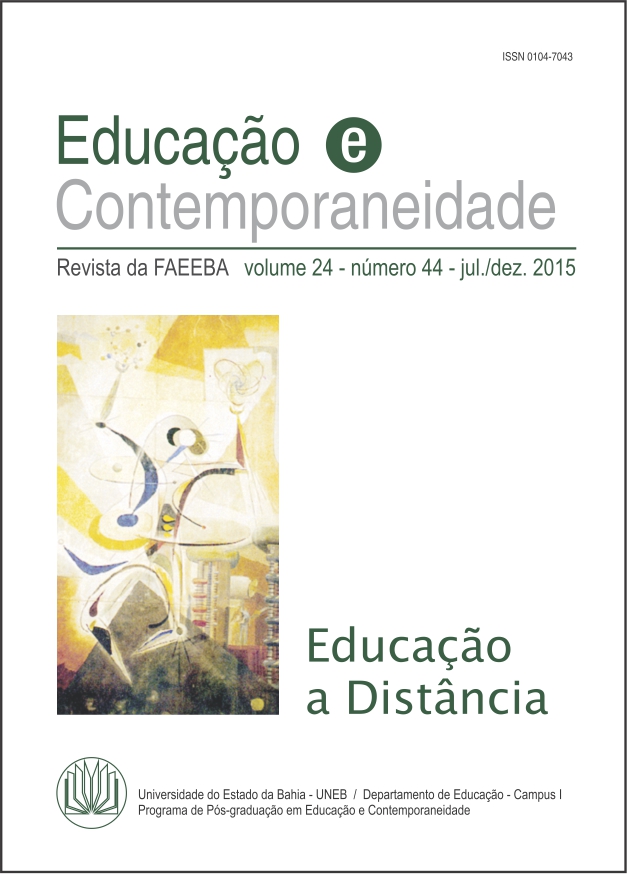EDUCAÇÃO ONLINE E AS IMPLICAÇÕES DA INTELIGÊNCIA ARTIFICIAL
DOI:
https://doi.org/10.21879/faeeba2358-0194.2015.v24.n44.p25-39Keywords:
Educação online. Aprendizagem colaborativa online. Inteligência artificial. Inteligência humana aumentada.Abstract
A compreensão do conceito de Educação Online passa pela discussão dos muitos termos antitéticos que o cercam, os vários termos que são usados como sinônimos em lugar de subcategorias, as pedagogias que são implicadas por esse processo e as epistemologias que os sustentam. Neste artigo, propomo-nos a apresentar um horizonte teórico e uma pedagogia da Aprendizagem Colaborativa Online que permite o desenvolvimento de uma Inteligência Humana Aumentada, em oposição à ameaça representada pelo crescimento da Inteligência Artificial e de seu uso na educação. Para tanto, apresentamos o conceito de Educação Online, seu contexto histórico, teórico, epistemológico, tecnológico e suas perspectivas pedagógicas para afirmar a necessidade de canalizar o poder da educação online para aumentar a atuação humana e a sabedoria coletiva.
Downloads
References
BATES, A. W. What’s right and what’s wrong about Coursera-style MOOCs. 2012. Disponível em: <http://www.tonybates.ca/2012/08/05/whats-right-and-whats-wrong-about-coursera-style-moocs/#sthash.zjWVOsC2.dpuf>. Acesso em: 03 ago. 2015.
______. Teaching in a Digital Age. Victoria, BC: BCcampus/Pressbooks, 2015. Disponível em: <http://opentextbc.ca/teachinginadigitalage/>. Acesso em: 03 ago. 2015.
FUTURE OF LIFE INSTITUTE. Autonomous weapons: an open letter from AI & robotics researchers. 2015.Disponível em: <http://futureoflife.org/AI/open_letter_autonomous_weapons>. Acesso em: 03 ago. 2015.
HARASIM, L. M. Learning theory and Bonline technologies. New York, NY: Routledge, 2012.
______. Online Education: Perspectives on a New Environment. New York: Praeger Publishers, 1990.
HARASIM, L. M. et al. Learning networks: a field guide to teaching and learning online. Cambridge, MA: MITPress, 1995.
HARASIM, L. M.; SMITH, D. E. Making Connections, Thinking Change Together: Women teachers and computer networks. In: BOURNE, Paula et al (Org.). Feminism and Education: A Canadian Perspective. Toronto: CWSE,OISE, 1994.
HAWKING, Stephen. et al. Stephen Hawking: “Transcendence looks at the implications of artificial intelligence – but are we taking AI seriously enough?”. Independent, 01 May, 2014. Disponível em: <http://www.independent.co.uk/news/science/stephen-hawking-transcendence-looks-at-the-implications-of-artificial-intelligence--but-are--we-taking-ai-seriously-enough-9313474.html>. Acesso em: 01 maio 2014.
HIGH, P. Udacity CEO and Former Google X Head Reflects on What Makes America Special. Forbes Magazine.
9 dez. 2013. Disponível em: <http://www.forbes.com/sites/peterhigh/2013/12/09/udacity-ceo-sebastian-thrun-on--the-future-of-education/>. Acesso em: 03 ago. 2015.
HEUSSNER, K. M. More money for MOOCs: Coursera Nabs $43 million from diverse set of investors. Gigaom, 10 jul. 2013. Disponível em: <https://gigaom.com/2013/07/10/more-money-for-moocs-coursera-nabs-43m-from--diverse-set-of-investors/>. Acesso em: 03 ago. 2015.
HILTZ, S.R.; TUROFF, M. The network nation: human communication via computer. Reading, MA: Addison--Wesley, 1978.
HO, A. D. HarvardX and MITx: The first year of open online courses. Rochester, NY: Social Science Research Network, 2014. Disponível em: http://papers.ssrn.com/abstract=2381263>. Acesso em: 03 ago. 2015.
KURZWEIL, R. The singularity is near: when humans transcend biology. New York: Viking Books, 2005.
MARKOFF, John. Relax, the terminator is far away. The New York Times, May 25, 2015. Disponível em: <http://www.nytimes.com/2015/05/26/science/darpa-robotics-challenge-terminator.html>. Acesso em: 03 ago. 2015.
MASON, R.; KAYE, A. (Org.) Mindweave: communication, computers and distance education. Oxford: Pergamon Press, 1989.
TOMASELLO, M. A natural history of human thinking. Cambridge, MA: Harvard University Press, 2014.
VICTOR, D. Elon Musk and Stephen Hawking among hundreds to urge ban on military robots. New York Times, July 27, 2015.
VYGOTSKY, L. S. Thought and language. Cambridge, MA: MIT Press, 1962.
Published
How to Cite
Issue
Section
License
O encaminhamento dos textos para a revista implica a autorização para a publicação.
A aceitação para a publicação implica na cessão de direitos de primeira publicação para a revista.
Os direitos autorais permanecem com os autores.
Após a primeira publicação, os autores têm autorização para a divulgação do trabalho por outros meios (ex.: repositório institucional ou capítulo de livro), desde que citada a fonte completa.
Os autores dos textos assumem que são autores de todo o conteúdo fornecido na submissão e que possuem autorização para uso de conteúdo protegido por direitos autorais reproduzido em sua submissão.
Atualizado em 15/07/2017

















































